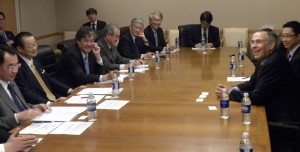Politics is the art of looking for trouble, finding it everywhere, diagnosing it incorrectly, and applying the wrong remedies – Groucho Marx

Last year, Japanese politicians Takeo Kawamura, Ryu Shionoya and Shunichi Suzuki visited the American Association for the Advancement of Science (AAAS) in Washington D.C., meeting with CEO Rush Holt. They have been acquaintances since Rush was in Congress. Image: AAA
Notwithstanding Groucho Marx’s somewhat idiosyncratic sentiments concerning the profession of politics, a project as large as the ILC will inevitably create a political test that will be every bit as challenging as the technical one. Technical progress is easily quantified. Counting the pages in the Technical Design Report provides a measure of this sort. Technical reviews attempt to assess the quality of the design. However political progress is a slightly more ethereal concept. Indeed one can wonder what political progress even means. Can it be measured? Not in the accepted sense of the word, that much is clear. It is too diffuse and messy, though to paraphrase an oft-used metaphor some would claim to “know it when they see it”. In this context one evident sign of the burgeoning political maturity of the ILC is the meeting which will take place in Washington D.C. in a few weeks’ time. It is titled the US-Japan Forum on Science Technology strategy. The meeting will be co-hosted by our old friends of the Advanced Accelerator Association Promoting Science and Technology of Japan (AAA) and the Hudson Institute, a Washington,-D.C.-based think tank. The meeting is scheduled for two days and will conclude with a press conference featuring some of the participants.
What makes this particular meeting special? After all science and technology collaboration between the US and Japan has gone on for at least fifty years. On the first day, the forum will focus on large-scale international projects based on advanced science and technology and identifies: nuclear fusion, Space activities (International Space Station), advanced accelerator technology, notably the ILC, and high-speed computing. It will cover both the research goals and the technology spin-offs. What is special is that this will be the first time to my knowledge that both Japanese and US politicians (of different persuasions) will sit down together, in public, with the ILC a prominent topic of debate. A panel discussion between both sets of politicians will be a special feature of this first-day programme.
The second day of the meeting is more focused and nuts and bolts (i.e. no politicians, just their staff members) but (among other items) it envisages a session on planning for US-Japan cooperation in the ILC project with japan’s Ministry of Education, Culture, Sports, Science and Technology (MEXT,) some U.S. Department of Energy (DOE), Office of Science and Technology Policy of White House (OSTP), Embassy and Congressional staff members and a few representatives of the science community in the same room. Again another first for the ILC project.
So what can we expect from the forum? In the near term: not much. We can anticipate a short concluding statement in the traditional fashion emphasising mutual benefits from science and technology without many specifics. Since Japan itself has not yet (finally?) decided to pursue the project there is a limit to what can be envisaged. However, it would be misleading to think that that will be all there is to it. Much like an iceberg, 90% of the activity in these kinds of get-togethers is not terribly visible but it is real nonetheless. Building a political consensus is difficult, building an international political consensus is much more difficult yet. But it must start somewhere and semi-formal gatherings such as this one provide the environment to nurture such actions. Thus what we will see is one more step on the way to the realisation of a linear collider. Hopefully Groucho’s view on politics doesn’t apply to all circumstances.


Recent Comments